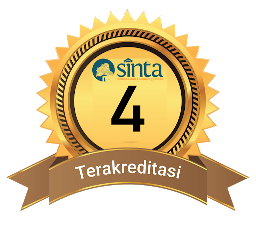Pengembangan E-LKPD Berbasis Model Problem Based Learning Terintegrasi Etnokimia pada Materi Asam Basa
DOI:
10.29303/cep.v8i1.9091Published:
2025-05-31Issue:
Vol. 8 No. 1 (2025): Edisi MeiKeywords:
E-LKPD, Problem Based Learning, Acid BasedArticles
Downloads
How to Cite
Abstract
This study aims to develop E-LKPD based on the Problem Based Learning (PBL) model integrated with ethnochemistry that is valid based on aspects of content feasibility, characteristics of ethnochemistry integrated problem based learning, linguistic aspects, presentation and graphics, and to determine user responses to E-LKPD when used in the learning process. The research method used is Research and Development (R&D) with the 4D development model (Define, Design, Develop, and Disseminate). The trial subjects involved teachers and students of class XI of SMAN 2 Rimba Melintang and SMAN 15 Pekanbaru. Data were obtained through expert validation and user response questionnaires. The results of the study showed that the developed E-LKPD was declared valid and feasible to be used as one of the teaching materials, and the responses of teachers and students to E-LKPD in limited trials showed that E-LKPD was included in the very good category when used in the learning process.
References
Astra, I.M., Raihanati, R., & Mujayanah, N. (2020). Development of Electronic Model Using Creative Problem-Solving Model Equipped with HOTS Problem on The Kinetic of Gases Material. Jurnal Penelitian & Pengembangan Pendidikan Fisika, 6(2), 181-194, https://doi.org/10.21009/1.06205
Badan Standar Nasional Pendidikan. (2006). Panduan Penyusunan Kurikulum Tingkat Satuan Pendidikan Jenjang Pendidikan Dasar dan Menengah. Jakarta: Departemen Pendidikan Nasional.
Depdiknas. (2008). Panduan Pengembangan Bahan Ajar. Jakarta: Direktorat Jendral Manajemen Pendidikan Dasar dan Menengah
Ibrahim, & Subali. (2017). Pengembangan Bahan Ajar & Pengembangan Instrument Pengukuran Pembelajaran Biologi. Workshop Pendidikan Biologi FKIP ULM
Muhali, M. (2019). Pembelajaran Inovatif Abad Ke-21. Jurnal Penelitian dan Pengkajian Ilmu Pendidikan: e-Saintika, 3(2), 25-50. https://doi.org/10.36312/esaintika.v3i2.16
Muhtarom, H. & Kurniasih, D. (2020). Pengaruh model pembelajaran abad 21 terhadap pembelajaran sejarah Eropa. Bihari: Jurnal Pendidikan Sejarah dan Ilmu Sejarah, 3(2), 59-65. Retrieved from https://jurnal.unsil.ac.id/index.php/bihari/article/view/2519
Nianti, R. E., Haryati, S., & Herdini, H. (2022). “Pengembangan e-LKPD berbasis connecting, organizing, reflecting, extending berbantuan liveworksheets pada pokok bahasan asam basa”. Jurnal Pendidikan Kimia Universitas Riau, 7, no. 1:34-41.
Pawestri, E., & Zulfiati, H. M. (2020). Pengembangan lembar kerja peserta didik (lkpd) untuk mengakomodasi keberagaman siswa pada pembelajaran tematik kelas II di SD Muhammadiyah Danunegaran. Trihayu: Jurnal Pendidikan Ke-SD-an, 6(3), 903-913.
Prastowo, A. (2012). Metode Penelitian Kualitatif Dalam Perspektif Rancangan dan Penelitian. Jogjakarta: Ar-Ruzz Media.
Rahmawati, Y., & Ridwan, A. (2018). Etnokimia dalam Pembelajaran Kimia: Alternatif Pembelajaran Kontekstual Berbasis Budaya Lokal. Jurnal Pendidikan Kimia, 12(1), 45-58.
Riduwan. 2013. Skala Pengukuran Variabel-variabel Penelitian. Bandung: Alfabeta.
Rofiah, N. H. (2014). Pengembangan Lembar Kerja Peserta Didik (LKPD) Berbasis KIT Untuk Meningkatkan Keterampilan Proses Dasar IPA Di MISD. Jurnal Al Bidayah, 6(2), 253-271. https://doi.org/10.14421/al-bidayah.v6i2.9045
Rumansyah. (2002). Penerapan Metode Latihan Berstruktur dalam Meningkatkan Pemahaman Siswa terhadap Konsep Persamaan Kimia. Jurnal Pendidikan dan Kebudayaan, 35, 172.
Salirawati, D. (2011). Materi Pelatihan Kepala Laboratorium Kimia Bagi Guru-guru Kimia. Kabupaten Kulon Rogo. Makalah Pelatihan Yogyakarta: Tidak Diterbitkan
Siswoyo, Dwi. (2013). Ilmu Pendidikan. Yogyakarta: UNY Press.
Sugiyono. 2019. Memahami Penelitian Kualitatif. Bandung: Alfabeta.
Suhaimi, I. & Permatasari, F. (2021). Model pembelajaran abad 21 dan pembelajaran menulis kolaborasi. Jurnal Koulutus, 4(2), 211-223. Retrieved from https://www.ejournal.kahuripan.ac.id/index.php/koulutus/article/view/715
Sumarni, W. (2018). Etnosains dalam Pembelajaran Kimia: Prinsip, Pengembangan, dan Implementasinya. Semarang: UNNES Press
Taher, A. (2023). Literatur Review: Keterkaitan Pembelajaran Kimia Terhadap Pendekatan Etnokimia Di Indonesia. Jurnal Pentagon, 7(2), 238-246. https://doi.org/10.30743/cheds.v7i2.8416
Thiagarajan, S., Semmel, D. S & Semmel, M. I. (1974). Instructional Development for Training Teachers of Expectional Children. Minneapolis, Minnesota: Leadership Training Institute/Special Education, University of Minnesota. https://www.semanticscholar.org/paper/Instructional-Development-for-Training-Teachers-of-Thiagarajan/44a718a0c8e219b37aabb4c36117dcd695c895d0
Author Biography
Risqa Putri Ika, Pendidikan Kimia, Universitas Mataram
License
Copyright (c) 2025 risqa putri ika; Maria Erna, Sri Hayati

This work is licensed under a Creative Commons Attribution-ShareAlike 4.0 International License.
Authors who publish with Chemistry Education Practice agree to the following terms:
- Authors retain copyright and grant the journal right of first publication with the work simultaneously licensed under a Creative Commons Attribution License 4.0 International License (CC-BY-SA License). This license allows authors to use all articles, data sets, graphics, and appendices in data mining applications, search engines, web sites, blogs, and other platforms by providing an appropriate reference. The journal allows the author(s) to hold the copyright without restrictions and will retain publishing rights without restrictions.
- Authors are able to enter into separate, additional contractual arrangements for the non-exclusive distribution of the journal's published version of the work (e.g., post it to an institutional repository or publish it in a book), with an acknowledgement of its initial publication in Chemistry Education Practice.
- Authors are permitted and encouraged to post their work online (e.g., in institutional repositories or on their website) prior to and during the submission process, as it can lead to productive exchanges, as well as earlier and greater citation of published work (See The Effect of Open Access).






